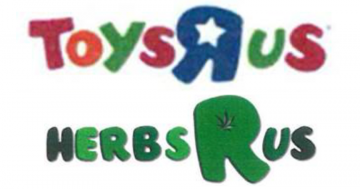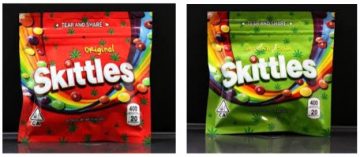Since the Canadian Government’s lauded legalization of recreational cannabis in 2018, much of the buzz seems to have worn off – both in terms of public / media attention and the “overgrown” market’s appetite for new start-ups.[1] However, in the legal world, this budding industry is still at the forefront when it comes to concerns around intellectual property. Rather than focusing on the protection of various cannabis strains and their related products through the Trademarks Act (TA) and Plant Breeders’ Rights Act, I have chosen to examine the protections that household brands have sought to enforce against pot producers. The relevant caselaw, discussed below, demonstrates that the TA, passing off, and depreciation of goodwill have all been useful tools for defending well-known marks. The cases also shed light on the financial consequences that commercial enterprises operating in this field are likely to face, depending on the reprehensibility of their conduct.
Starting with Toys “R” Us (Canada) Ltd. v Herbs “R” Us Wellness Society, 2020 FC 682, Toys “R” Us (Canada) sought to enforce various trademarks against a Vancouver-based “cannabis boutique and dispensary.”[2] This relied primarily on the former’s ownership of the iconic multichromatic mark with backward “R” seen outside of its stores. Despite dismissing both a passing off and trademark infringement action and finding the marks to be insufficiently confusing for even the “casual or hurried observer,” the Federal Court held that the use of the “HERBS R US” design mark was likely to depreciate the goodwill attaching to the registered trademark “TOYS R US & Design,” contrary to s.22 of the TA. The court granted an injunction to prevent the use of the HERBS R US trademark and awarded nominal damages of $15 000 and costs to Toys R Us.

The case is notable for arguably expanding the extent to which “depreciation of goodwill” will be found in cases where non-identical trademarks with a similar “look and feel” are operating in completely different consumer contexts.[3] The SCC has recognized that s.22 can be a potentially anti-competitive “super weapon” that must be kept in check,[4] and the Federal Court of Appeal’s recent jurisprudence has only vaguely suggested that successful claims may extend “beyond identical marks and mere misspellings.”[5] Nonetheless, Toys R Us satisfied all four elements of the SCC’s Veuve Clicquot test, clearing the hurdle of the first step to establish a mental association between the marks that was “all but inevitable, and must be inferred to have been intended.” It did so despite the differences in the marks clearly going beyond mere misspelling – note the difference in colour palette and orientation of the “R”. The court conspicuously declined to award punitive damages, finding that HERBS R US was not targeting its cannabis at children.
The Federal Court heard a similar case the following year, in Subway IP LLC v Budway, Cannabis & Wellness Store, 2021 FC 583. Subway IP LLC argued that the respondents had infringed their trademarks. Unlike in the previous case, Subway established both passing off (under paragraph 7(b) of the TA) and infringement (under s. 20) in Budway’s marks, as well as a s.22 depreciation of goodwill. The court found a reasonable likelihood of confusion, again ultimately awarding a permanent injunction, nominal damages in the amount of $15 000, and costs against Budway.

How did the court arrive at this conclusion, when it found a lack of confusion in the previous case? While in both instances it was clear that the bud businesses deliberately drew on an applicant’s famous mark, the difference was in the similarity of the goods on offer. Whereas Herbs concerned fundamentally different products, Subway and Budway both “offer foodstuffs and edible products to their consumers.”[6] Subway successfully demonstrated that its registered mark was associated with “cookies” in general, which would even cover those containing cannabis. Budway further leaned into the Subway comparison by advertising with “a ‘mascot’ in the form of a submarine sandwich filled with cannabis leaves, with what are apparently bloodshot and half-opened eyes. This mascot appears in the video clip, smoking what is presumably a joint, with the legend ‘It’s the way, bud’ appearing below it.”[7]
As for passing off, goodwill was easily demonstrated, as was misrepresentation causing likely confusion among the public. Damage was found by virtue of Subway’s loss of control over the use and commercial impact of its marks, resulting in harm to its goodwill and reputation. The four steps of the s.22 test were also readily satisfied.
Subway sought $20 000 in punitive damages. The court opted once again to not grant these damages, which it noted (quoting Whiten v Pilot Insurance Co, 2002 SCC 18) are reserved for “malicious, oppressive and high-handed” misconduct representing a “marked departure from ordinary standards of decent behaviour” that offends the court’s sense of decency.
For an illustration of where the court will award punitive damages, Mars Canada Inc. v John Doe #1 (King Tuts Cannabis), 2022 FC 1193 is instructive.

Mars easily established goodwill, showing that its Skittles brand’s marks and trade dress were distinctive and widely recognized over decades of sales. The infringing product was nearly identical and evidence demonstrated actual consumer confusion resulting in harm to children. The widespread media coverage referencing Mars’ product was sufficient to establish potential damage to its reputation and goodwill.[9] Depreciation of goodwill was also made out.
The defendants, which included the manufacturer and various online retailers, had organized their online activities in such a way as to protect their anonymity. This made it difficult to serve statements of claim. Two distributors denied (contrary to screenshot evidence) having sold the infringing product on their websites, while another continued to advertise it and was unreachable via email or phone. When service was effected for some of the respondent distributors, none filed statements of defence. This ultimately lead the judge to find three of them in default.
Once again, $15 000 in nominal damages was awarded against each defendant as a result of the negative publicity Skittles experienced. The court also awarded punitive damages, finding that the “[d]efendants’ efforts to remain anonymous support the conclusion that they had knowledge of the unlawful nature of their activity … [and] that advertising and offering for sale of a potentially dangerous product using appropriated trademarks that are evidently and obviously attractive to children represents a marked departure from ordinary standards of decent behaviour that deserves to be denounced and deterred.” In other words, the court found the impugned conduct to be particularly blameworthy, and ordered that each of the pernicious pot peddlers pay an additional $30 000 penalty.
It should additionally be noted that this type of canna-copying is not strictly limited to jurisdictions where weed has been nationally decriminalized. While in the U.S., depreciation of goodwill cases are on the decline,[10] cannabis companies are still ending up in the crosshairs. Following a settlement agreement between Wrigley and a cannabis manufacturer / distributor (“Terphogz”), an American court granted a permanent injunction against the latter’s infringing use of the Skittles marks and confusingly similar terms.[11] It was prohibited from using “any name, mark, designation, slogan, domain name, social media handle, or design containing the term ZKITTLEZ, ZKITTLES, SKITTLEZ, SKITTLZ, ZKITTLZ,” etc. and from promoting any new product with reference to the preceding marks. Similar legal action has also been pursued by snack producers in the United Kingdom.[12]
Overall, some key takeaways can be summarized as follows:
Cannabis companies, legal or otherwise, seem particularly prone to running afoul of IP protections. This may be somewhat explained by the desire of a traditionally anti-corporate subculture to poke fun at big brand names. What is certain is that there is a strong financial incentive to capitalize on these brands’ market successes. It must be remembered that unlike copyright law’s parody carveout, trademark law has no sense of humour when it comes to infringement. As Giselle Chin notes, “parody or satire is not a viable defence to trademark infringement, passing off or depreciation of goodwill.”[13]
The cases also illustrate the added difficulty of enforcing TM rights against a grey or black market purveyor of goods. Illegal cannabis vendors will rarely reveal themselves for the purposes of defending a lawsuit, and it may not be easy to extract damages out of a business that no longer exists. Oftentimes, an applicant will have to go after multiple defendants, including individuals, in order to achieve a desired outcome. Nevertheless, where a defendant may be identified, IP lawyer Graham Hood observes that there is “expeditious relief available to brand owners in Canadian trademark litigation [as well as] serious consequences for cannabis companies that (foolishly) adopt parody marks to piggyback on the goodwill and reputation of established brands.”[14]
Third, the courts are willing to award punitive damages against said vendors, but only in such specific circumstances as where there is clear actual or likely harm to a vulnerable group. The mere fact that a mark makes obvious reference to a children’s brand is insufficient to demonstrate a marked departure from ordinary standards. Nevertheless, snacks and candies containing THC continue to be marketed under the guise of reputable brands in Canada and abroad, promising future litigation in this area.[15]
Finally, the plethora of domestic cases on the issue depreciation of goodwill demonstrate that trademark dilution claims are “alive and well in Canada.”[16] This stands in contrast to the U.S., where federal trademark dilution cases have precipitously dropped off. These claims “fill the gap” and serve as a boon to beleaguered brands where trademark infringement and passing off cannot be established.
What do you think – were these companies overzealous in pursuing pot proliferators? Or is this kind of action necessary to prevent one’s hard-won goodwill and reputation from going up in smoke?
[1] Graham Hood, “Don’t let your brand go to pot (Part II): how cannabis brand owners can cover their ‘buds’ with plant breeders’ rights” (2018), online: Linkedin <https://www.linkedin.com/pulse/dont-let-your-brand-go-pot-part-ii-how-cannabis-owners-graham-a-hood>.
[2] Toys “R” Us (Canada) Ltd. v Herbs “R” Us Wellness Society, 2020 FC 682.
[3] “Playtime’s over: Toys R Us wins trademark depreciation of goodwill claim against Herbs R Us” (2020), online: Norton Rose Fulbright <https://www.nortonrosefulbright.com/en-ca/knowledge/publications/ec4a7c19/playtimes-over-toys-r-us-wins-trademark-depreciation-of-goodwill-claim-against-herbs-r-us>.
[4] Veuve Clicquot Ponsardin v Boutiques Cliquot, 2006 SCC 23.
[5] “Playtime’s over,” supra note 3.
[6] Subway IP LLC v Budway, Cannabis & Wellness Store, 2021 FC 583 at para 28.
[7] Ibid. at para 13.
[8] Graham Hood, “End of the Line: Federal Court finds Subway’s trademark rights infringed by cannabis retailer that adopted ‘Budway’ parody mark” (2021), online: Smart & Biggar <https://www.smartbiggar.ca/insights/publication/end-of-the-line-federal-court-finds-subway-s-trademark-rights-infringed-by-cannabis-retailer-that-adopted-Budway-parody-mark>.
[9] Mars Canada Inc. v John Doe #1 (King Tuts Cannabis), 2022 FC 1193 at para 35.
[10] “End of the Line,” supra note 8.
[11] WM. Wrigley Jr. Co. v. Terphogz, LLC 2023 USDC, ND of Illinois 21-CV-02357.
[12] Sanya Burgess, “Cannabis sweets ‘marketed at children’ being widely sold on social media” (2022), online: Sky News <https://news.sky.com/story/cannabis-sweets-marketed-at-children-being-widely-sold-on-social-media-12697282>.
[13] Giselle Chin, “Depreciation of goodwill with cannabis trademarks” (2020), online: Canadian Lawyer <https://www.canadianlawyermag.com/inhouse/news/opinion/depreciation-of-goodwill-with-cannabis-trademarks/334167>.
[14] “End of the Line,” supra note 8.
[15] Burgess, supra note 12.
[16] Ibid.
 Copyright & Social Media
Copyright & Social Media Communications Law
Communications Law